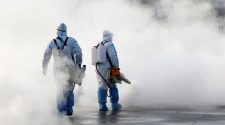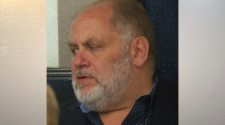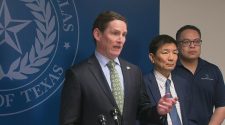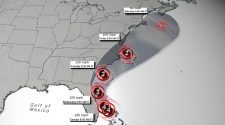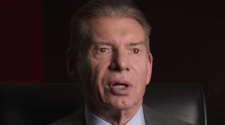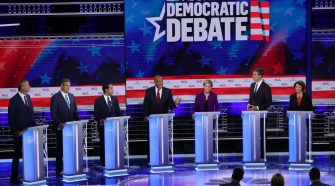Oil prices surged, setting off a rally in shares of energy companies, after President Trump said on Thursday that he expected that Saudi Arabia and Russia would substantially cut their oil production to halt the collapse of prices.
Mr. Trump said in a tweet that he spoke with Crown Prince Mohammed bin Salman, who had spoken with President Vladimir V. Putin. “I expect & hope that they will be cutting back approximately 10 million barrels,” he said. That figure represents about 10 percent of normal world consumption. The president later said the cut could be as much as 15 million barrels.
Saudi Arabia called on Thursday for an urgent meeting of the Organization of the Petroleum Exporting Countries and other oil-producing countries with the “aim of reaching a fair agreement to restore” balance in the oil markets. The Saudis said in a statement that they were acting to support the global economy and in “appreciation” of Mr. Trump’s request.
The Kremlin denied that Mr. Putin had spoken to the Saudi crown prince, as Mr. Trump had said in his Twitter message. “No, there was no conversation,” Dmitri S. Peskov, spokesman for Mr. Putin, told the Interfax news agency.
Still, crude oil futures, which had already been climbing on Thursday, surged by about 20 percent, and shares of oil and gas companies rallied. Occidental Petroleum was the best performing stock in the S&P 500, with a gain of about 16 percent. Halliburton rose about 12 percent.
Oil prices had been hammered as the coronavirus pandemic all but eliminated travel and damped demand for energy. A price war that broke out between Saudi Arabia and Russia last month intensified the decline. After the countries failed to reach a deal on production cuts, both instead increased output in an effort to gain market share.
The combination of slumping demand and the contest between two of the world’s largest oil producers had pushed crude oil prices down by 55 percent in March alone, wreaking havoc on the energy industry, with oil companies slashing budgets, and refineries cutting production of gasoline, diesel and jet fuel.
The possibility of some relief to the industry was also welcomed by stock investors.
Though the rally in energy companies Thursday bolstered the stock market — with the S&P 500 rising as much as 2 percent at one point — those gains eventually faded. Earlier on Thursday, a report on jobless claims showed that 6.6 million people filed for unemployment benefits last week in the latest sign of the economic damage wrought across the country by the coronavirus pandemic.
Businesses dependent on consumer spending were battered as a result. Retailers ranging from Gap to Walgreens Boots Alliance fell. Live Nation Entertainment, which produces concerts and sells tickets to events, was one of the worst-performing stocks in the S&P 500.
More than 6.6 million people filed new claims for unemployment benefits last week, the Labor Department said Thursday, setting a grim record for the second straight week.
The latest claims brought the two-week total to nearly 10 million.
The speed and scale of the job losses is without precedent. Until last month, the worst week for unemployment filings was 695,000 in 1982.
“What usually takes months or quarters to happen in a recession is happening in a matter of weeks,” said Michelle Meyer, chief U.S. economist for Bank of America Merrill Lynch.
A month ago, most forecasters still thought the United States could avoid a recession. Today, with the pandemic shuttering businesses and forcing vast layoffs, many economists are expecting a decline in gross domestic product that rivals the worst periods of the Great Depression.
The Labor Department’s report on Thursday that 6.6 million Americans filed claims for unemployment benefits last week only increases the pressure on President Trump and members of Congress to ready another package to further aid workers and businesses through the coronavirus crisis.
The $2.2 trillion package that Mr. Trump signed into law last week includes enhanced benefits for unemployed workers for up to four months, along with aid for large and small businesses and direct payments to millions of individuals, as the country struggles through a shutdown of economic activity meant to slow the spread of the virus.
Many economists have warned that the $350 billion included in that most recent package for aid to small businesses will not prove sufficient to help all of the companies that might otherwise go under during the shutdowns.
R. Glenn Hubbard, a Columbia University economist and former adviser to President George W. Bush, said in an interview that the necessary assistance was likely to be “closer to $1 trillion,” which would require another $650 billion appropriation from Congress.
Democrats, including Speaker Nancy Pelosi of California, have pushed for additional payments to reach more Americans, to help people continue to pay their bills through the crisis. Senator Sherrod Brown of Ohio has called for federally funded “hazard pay” for doctors, nurses, grocery store clerks, postal carriers and other workers on the front lines of the virus.
Mr. Trump and Democratic leaders have also called for a sweeping investment in infrastructure, like broadband expansion and bridge repair, that could put millions of Americans to work once the crisis abates. Republican leaders in the House and Senate have shown less enthusiasm for many of those ideas.
Banks say structure of new small business lending program is unworkable.
With a $350 billion emergency lending program for small businesses supposed to begin on Friday, bank lobbying groups have told the Treasury Department that the structure is unworkable and creates too much risk.
The program, created as part of a $2 trillion spending plan passed by lawmakers last week, offers companies and nonprofit organizations with up to 500 workers a low-interest loan to cover up to two months of payroll and other expenses. Most — and in some cases, all — of the loan will be forgiven if the borrower retains workers and does not cut wages.
In letters and telephone calls, the groups have warned the Treasury Department that the program as written will not be workable, and that millions of businesses expecting funds to be approved and released in a matter of hours are likely going to be disappointed if the current government guidance is not updated.
The top concern among banks is about their own liability as they try to rush money to borrowers while being required to verify their applications and keep tabs on potential fraud. Banks are concerned that they could be held liable for loans made to borrowers who provide inaccurate or fraudulent information.
Remuneration for taking on these risks is also a worry. The Independent Community Bankers of America sent a letter to Treasury Secretary Steven Mnuchin on Wednesday complaining that the existing guidelines that call for loans to be made with 0.5 percent interest rates means that banks will not be able to break even on those loans, creating “unacceptable losses” for lenders.
“I urge you to consider that community banks are themselves small businesses and important employers in their communities,” Rebeca Romero Rainey, chief executive of banking group, wrote in the letter.
Bank lobbyists were expecting that the Treasury would release new guidance on Thursday that would clarify the liability concerns and ensure that lenders could use an automated process that relies on borrowers attesting to their financial predicaments. Treasury officials did not immediately respond to a request for comment.
That one-two punch has staggered these funds, which were already chronically underfunded. Most are required by law to keep sending checks every month to about 11 million Americans.
Even before the pandemic gut-punched the economy, Maria Pappas, the treasurer of Cook County, Ill., counted a record 57,000 delinquent property-tax payers in her county, which includes Chicago. Property taxes feed more than 400 municipal pension funds in Cook County, including some that are cash-starved and close to hitting bottom.
“The people have no money,” said Ms. Pappas.
Last week, Moody’s investors service estimated that state and local pension funds had lost $1 trillion in the market sell-off that began in February. The exact damage is hard to determine, though, because pension funds do not issue quarterly reports.
Pension funds that run out of money — something that happened in Prichard, Ala., Central Falls, R.I., and Puerto Rico — could tip cities and other local governments into bankruptcy. States would be in uncharted waters because there is no bankruptcy mechanism for them; the nearest analogy is a one-off law passed by Congress for Puerto Rico, which has resulted in years of federal oversight, austerity measures and reduced debt payments to bondholders.
Amazon, which has come under fire from employees and politicians for not taking sufficient steps to protect workers on the job during the pandemic, said it would ramp up safety efforts.
The company said in a blog post on Thursday that temperature checks, which it began at certain facilities last Sunday, were likely to be put in place across all of its U.S. and European facilities and Whole Foods stores by early next week, and that it was already checking the temperatures of more than 100,000 workers each day. Anyone with a fever of more than 100.4 degrees is sent home and asked to stay home until they are free of fever for three days, the company said.
The company also said it was in the process of procuring more hand sanitizer and disinfectant wipes for workers, and that it was beginning to distribute millions of masks to workers.
Workers who learned they had contracted the coronavirus or presumed they had but were unable to get tested could receive extra paid time off, and any worker who had contact with a person with the illness would receive 14 days of paid leave, Amazon said.
Amazon also said that it had already hired 80,000 of the 100,000 new workers it had pledged to hire in mid-March to keep up with recent demand.
Delta Air Lines told employees on Wednesday that it would allow flight attendants, baggage handlers, gate agents and other so-called front-line employees who were concerned about the coronavirus to stay home and still get paid.
Any employee concerned for their safety would be allowed to take voluntary leave and continue to be paid “in some form,” according to an internal memo to managers that was viewed by The New York Times. Managers, who are referred to as “leaders” at Delta were also instructed not to question the employees about whether they were personally at higher risk and were told to share guidance from the Centers for Disease Control and Prevention on high-risk factors associated with the virus.
“This is the right thing to do for our people who may be part of a high-risk group based on the latest C.D.C. guidance,” the airline said in a statement to The Times.
Separately, International Airlines Group, which operates British Airways, Iberia and other airlines, said on Thursday it was slashing its schedule by 90 percent in April and May. And British Airways said it had reached an agreement in which each of its 4,000 pilots would take four weeks of unpaid leave over the next two months.
Catch up: Here’s what else is going on.
-
The aviation unit of General Electric said it would temporarily furlough about half of its staff involved in engine assembly and component manufacturing. The furlough will last four weeks and the thousands of affected employees will still receive health benefits and at least some pay.
-
Amazon announced that its Prime Video service had partnered with the SXSW Film Festival to offer consumers the chance to view some of the movies that were scheduled to screen during the March event in Austin, Tex. The 10-day virtual experience will be provided free to customers with an Amazon account. SXSW filmmakers have until April 7 to opt into the festival, which Amazon hopes to introduce by the end of the month.
-
Ford Motor said Thursday that first quarter sales of new vehicles fell 12 percent because of a steep drop in the second half of March.
-
The chief executive of Boeing, Dave Calhoun, announced voluntary layoffs in a note to staff on Thursday, with details on eligibility and benefits to come in three to four weeks. “We’re in uncharted waters,” he said, adding that the layoffs would provide a bridge to recovery, provided “we’re not confronted with more unexpected challenges.”
-
Home Depot has ordered all 2,300 of its stores in North America to stop sales of N95 masks to try to free them up for those on the front lines of the coronavirus emergency response, the company said on Wednesday.
-
SoftBank has decided it will not buy $3 billion in WeWork stock, a board committee of the office space company said Wednesday, dealing a blow to shareholders who had hoped to cash out their shares. SoftBank, a dominant shareholder of WeWork that has poured billions of dollars into the company, could also hold back $1.1 billion of financing from WeWork, reducing the company’s access to cash as the downturn caused by the coronavirus hits the already stressed business.
Reporting was contributed by Nicole Sperling, Niraj Chokshi, Jim Tankersley, Peter Eavis, Stanley Reed, Ben Casselman, Patricia Cohen, Clifford Krauss, Andrew E. Kramer, Mary Williams Walsh, Keith Bradsher, Neal E. Boudette, Stefanos Chen, Keith Collins, David Yaffe-Bellany, Mohammed Hadi, Carlos Tejada and Daniel Victor.



